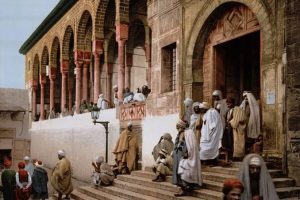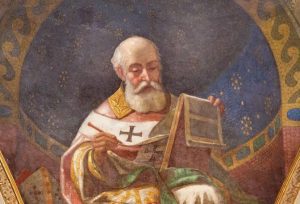Role of Political Philosophy in the formation of National Identity
Political philosophy plays a major role in the formation of national identity. Throughout the history of time, nations have had conflicts due to their political philosophies, and some philosophies have proven to be more successful for nations than other political philosophies.
The political beliefs of a state originate from its history and form the national choices of the state. Humanism and Poetic wisdom originate from the same state and similar circumstances, and poetic wisdom draws from humanism. Political Philosophy
Still, both stand distinctly opposed to one another on the philosophical spectrum. This paper introduces the two ideologies and draws a comparative analysis of competition between states that follow each political philosophy. Political Philosophy

Humanism originated out of Roman and Greek texts that resurfaced in what is now known as the renaissance. Drawing knowledge from the classical texts, renaissance philosophers were able to produce a body of literature and a school of thought that later came to be known as humanism.
It was the merger of contemporary problems and struggles with classical literature to draw out knowledge to produce new answers that shaped humanism originally. Political Philosophy
The ideas were individualistic and secular, humans were granted moral authority to oversee their religious activities, which transformed the society and values of renaissance Europe.
Humanism focused on humans as responsible creatures with morality that will behave responsibly once church patronage lessens.Poetic wisdom, on the other hand, came over a century after the renaissance.
The basic idea that Vico formulates is that human societies are in stages. These stages are of growth and decay and are not a constant elevation. Poetic wisdom aims to use the ideals of the stages of growth onto the ones of decay to achieve growth again. Political Philosophy
Vico understood that the reason why religion was not as unimportant was that it might seem outdated.
Still, he believed that the way of thinking changed and that once classical texts were put into contemporary contexts, they would be the answer which means the answer is always to return to the past rather than creating new knowledge.
Vico believed humans to be of brutal nature, a nature that was controlled through introducing Gods.
He believed that the decay of the age of Gods emerged from the imperfection of those religions.Christianity, he believed, was a perfect religion. Just as humanism does, poetic wisdom draws upon history for the formation of political philosophy.
Still, in contrast to the logical ideas that humanism considers the nature of the wisdom that Vico intended to draw from history is poetic, he focuses on the need for God and the perfect religion to bring about not just salvation but rather social equality and all of the things that humanists thought would be achieved by secularism. Political Philosophy

Several societies exist that invested in humanism, taking the example of modern-day America, the state is individualist and secular and is based on the very ideas of humanism that formed the renaissance which gave an initial boom to the state but a closer look shows that the society is heavily damaged and fragmented.
Issues such as class inequality and racism are prevalent in America, Vico has attributed the rise of economic inequality. Vico said that modesty and purity are the basis of all morality. Political Philosophy
So a society without an organization to promote those would be immoral, and I believe that racism is a kind of immorality. Further, a society invested in humanism isn’t manipulated by religious conflicts and thus is more logical.
The conflicts and stance on the international arena are both logical rather than emotional. Political Philosophy
In societies that aren’t bound by poetic wisdom, there is a lack of an all-inclusive identity. The original idea emerged in Europe as more and more nation-states were emerging, but in America, the idea fails greatly; the lack of binding religious identity has created several groups that are all defensive and, in being defensive, offensive towards each other.
There is a distorted social fabric, and even in Europe, it has led to an identity crisis and social turmoil.Vico argued that the only truth in the world was the common idea that originated among them but followed by entire groups of peoples who don’t know each other and have nothing in common but that one truth.
This, he argued, was the solid foundation of poetic wisdom.On the other hand, a society invested in poetic wisdom lags in the creation of logic. Society becomes so engulfed and paralyzed by the religious sentiments and identities of the past.
Poetic wisdom, that rational and logical wisdom are no longer acceptable to the social fabric of the societies. While not in its original form, polluted versions of poetic wisdom exist across Asia and Africa.
The clear distinction is general backwardness and a lack of acceptance to logic but the strong sense of identity and more coherent social fabrics, a robust civil society, and an acceptance of human rights violations because they are culturally relevant.

The issue again is that none of these states that apply polluted versions of poetic wisdom draw it from Christianity. Thus, according to Vico, they are still not the true answer as Christianity is the only true perfect religion.
On the other hand, an ideal society that invests in poetic wisdom would still struggle to accept logic and be backward and promote peace and be more socially inclusive. It would be a more economically equal social fabric with an identity so strong that there would be no internal conflict.

Both the schools of thought have pros and cons, but more importantly, both evolved, yet both still hold their pros and cons. A competition between the two shows that both tend to focus on two distinct things—one results in a weak and backward state with a strong national identity.
Still, the other one results in a strong and rich state with society in tatters and internal conflict to the point that a few conspiracy theories were enough to incite an insurrection or economic inequality to the point that there are yearlong protests or identity so weak that there are numerous separationist movements in the self-proclaimed fathers of democratic values and the ones responsible for spreading it to the world.
READ MORE: The Populist Threat to Liberal Democracy
Rizwan Sikandar is a student of history from Quaid-e-Azam university. He has a keen eye on events which he likes to analyze on bike rides of the city from Constitution Avenue to GHQ, Rawalpindi.






